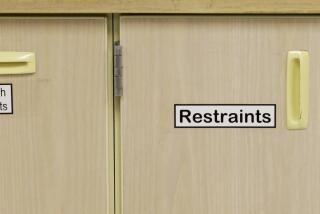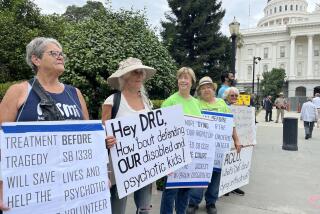Check the Mirror for Glimpse of Insanity
- Share via
Why do we willfully ignore the mentally ill and their troubling presence? If this avoidance is not willful, how then can we explain our society’s continued neglect of them? The headlines remind us now and then in an episodic manner: funding curtailed again for community mental health centers, despite overwhelming need. Lack of funding for emergency psychiatric services forces beleaguered professionals to turn away even the severely mentally ill, and then care for others by bedding them on pallets on the floor for lack of space.
A jailed person is guaranteed a bed by law; we treat our mentally ill less well than criminals. There are no guarantees for the fragile mentally ill who seek treatment in our overcrowded county facilities. Last year, every administrator of the Los Angeles County psychiatric units signed a “Declaration of Conscience” deploring the lack of funding and the abysmal conditions in county facilities.
Ignoring the mentally ill may be our way of avoiding our own fears: They force us to confront our own vulnerabilities.
The truth we cannot acknowledge is that each one of us has suffered from moments of temporary insanity. When we slow down when we see a policeman, we suffer from temporary paranoia. When we take an idea and invest it with meaning it doesn’t have, altering its importance out of context with reality, we suffer from temporary psychosis.
When we feel we can conquer the world and act without regard to consequences, we suffer from temporary mania. When we’re immobilized and cannot do anything, we suffer from temporary depression. When we cut corners to get ahead at someone else’s expense, we suffer from temporary sociopathy.
In today’s social climate, where the neurological and biochemical basis of mental illness is beginning to be understood, the mentally ill are still often treated as though the illness they suffer is a moral failing: They could be well if they willed themselves so and “cleaned up their act.” In this environment, the mentally ill feel unsupported and alone--alienated, alienating and, finally, alien.
If each one of us were frozen during a moment of temporary insanity and stigmatized like the mentally ill, what would we see on the faces of those around us? How would we deal with fear, disdain, pity and even avoidance on the faces we love most?
We must admit our vulnerabilities, confess our fears and then feel the common bonds of brotherhood that bind us, the “well” and the mentally ill. We must confront and conquer ourselves.


